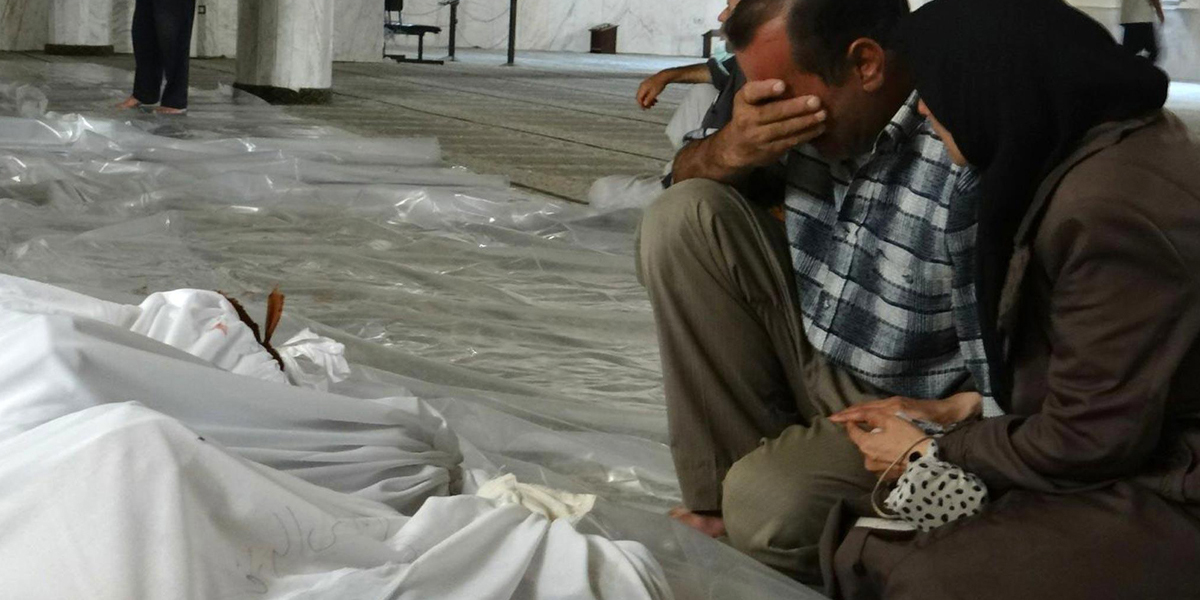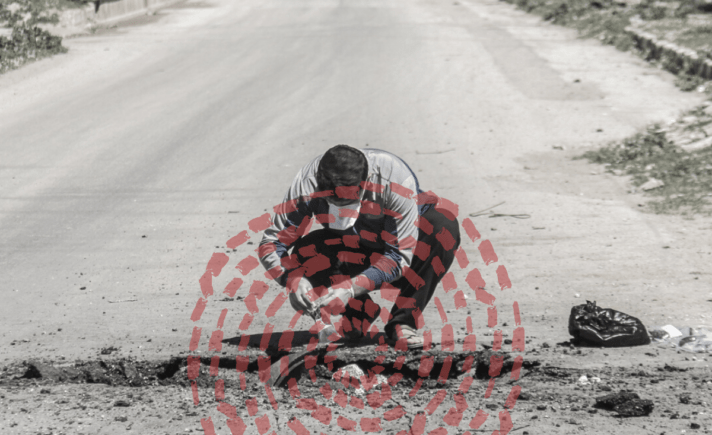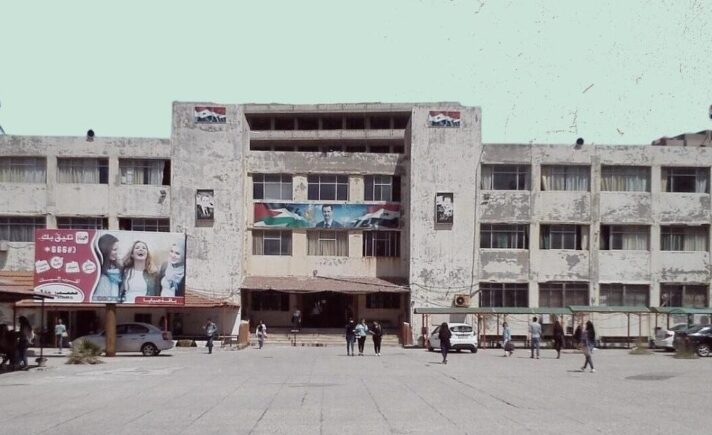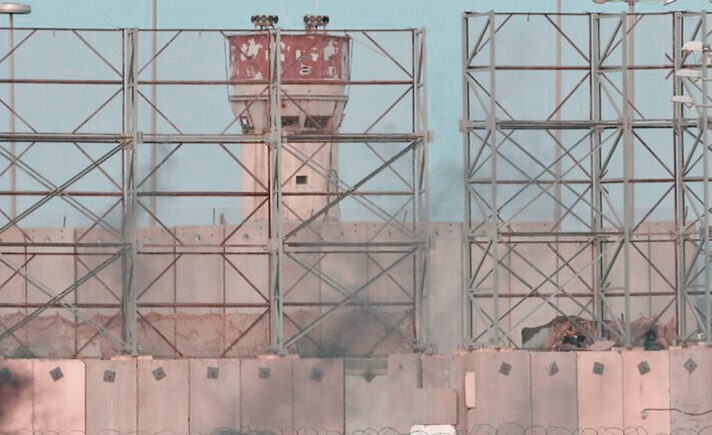“Abu Ali… Abu Ali.” I heard the trembling voice of my friend Thaer, along with a barrage of frantic knocks on the door, waking me up after midnight on 21 August, 2013. “There is only one reason for Thaer to come to me after midnight,” I thought while rushing out to meet him. “It must be a massacre.”
We lived in Eastern Ghouta, in the city of Douma, where I had lived my entire life until I was displaced in 2018. Douma is a small city, nine kilometers from the capital. I felt proud of my city’s participation in the revolution since March 2011. The city had been a target of raids, arrests, summary executions, and attacks on demonstrators for almost two years, until the liberation of the area from Syrian regime forces in late 2012.
At the time, we were documenting events to ensure that the news reached television channels and human rights organizations. During those years, my relationship with my friend Thaer, a young man studying law at Damascus University, strengthened. With the liberation of large parts of Eastern Ghouta at the end of 2012, he became like a brother to me, as many of my relatives and friends had left Syria at that point.
In the few seconds before I reached the door, all kinds of possibilities were running through my mind, as I imagined the worst-case scenarios. Perhaps a massacre took place in the al-Wafidin camp; the crossing separating Douma—which had been completely besieged since the beginning of 2013—from the Damascus highway, where regime forces were stationed, shooting any civilians trying to flee the siege towards Damascus or simply trying to get some food. Such attempts were often made around midnight, to take advantage of the darkness.
The second possibility, which I tried to avoid thinking of, was a chemical attack. The regime had already launched several chemical attacks on Eastern Ghouta. The first one that I witnessed was on 24 March, 2013, at Medical Center No. 1, the emergency post in Douma. I saw the paramedics running around, some of them washing the victims on the ground floor. Four paramedics were trying to stabilize one young man in order to insert an IV, while he was suffering from violent convulsions and acute constriction of the pupils.
Two people died that day, while others were in critical condition in intensive care units. The survivors left the emergency room wrapped in white sheets. “I feel like I’m on the Hajj pilgrimage,” I heard one of them jokingly telling another, in an attempt to ease the dread they had experienced. “I took a bath, threw away all my clothes, then they wrapped me in a white sheet” (referring to the attire worn by pilgrims in Mecca).
Despite the repeated chemical attacks on the area, all of which happened late at night, I was hoping Thaer had knocked on my door for some other reason. When I went out to meet Thaer, the street was so dark that I could not see his face. I only heard his voice: “Large chemical attack … Get your camera and come quickly.”
I went back to the house, calling my family to get up, and wake our neighbors. I was afraid, especially since I did not yet know where the targeted area was, and whether its effect could reach our neighborhood; I wanted them to stay awake and alert.
Despite the fear, I started giving them some instructions: “Bring some towels and sealed water bottles in case the gas reaches the area. Go up to the roof if you feel short of breath.”
Ignoring the guilt I felt for leaving my parents and siblings at home, I took my camera and ran out to the emergency post, ten minutes away; a basement of a residential building in the city center. When I arrived, I saw the paramedics taking off the clothes of victims and washing their bodies on the street, before taking them down the stairs to the emergency room.
At first glance, the basement staircase looked different to what I was used to seeing after bombings. There were no blood stains; death had no smell, not even the smell of gunpowder mixed with blood and debris. The first look at the water-drenched stairs failed to prepare me for the scale of the human suffering I saw. This time, death had a different smell, one I had never experienced before.
There were seven beds in the emergency department, and six more in the recovery room. I began to comprehend the catastrophic scene:
There are not enough beds for the injured.
Men, women, and children on the floor.
A man in his thirties screaming and turning left and right as he shakes and struggles to breathe.
A large number of victims had foam coming out of their mouths and noses.
The medical staff shout through the victims’ screams: “I need atropine quickly… intubation… oxygen!”
I stand there helpless, dazed, my hands shaking and my heart beating rapidly. I can’t do anything. I hate this helplessness. I can’t insert an IV, nor can I give injections, I can’t even perform CPR.
Holding my small camera, I turn it on. As it beeps, all the noise around me disappears, leaving me alone with that little sound. My eyes become an extension of the camera. Then I turn it off, and the overwhelming noise comes rushing back. I do it again, without documenting anything, then turn it off once more. On my left, I hear what sounds like someone singing. I look at him, and it is in fact my friend weeping with horror. I don’t understand why his crying sounded like singing to me.
I stand with my colleagues Abdullah, Yasser, Thaer, Ammar, and others, unable to take any pictures. I hate the camera. What good will taking pictures of these people do? Assad killed hundreds before them with sniper bullets, mortar shells, barrel bombs dropped from helicopters, and airstrikes from the fighter jets that never left the skies of Ghouta. None of this prompted any reactions.
Am I in danger of inhaling the gas? Will I die someday carrying this camera? Would these screams haunt my dreams if I survived?
I look at those convulsing in front of me. Do they want me to fight for them with my camera?
I wonder, should I have stayed with my family? What if my family gets injured while I’m filming here?
My agonizing thoughts were interrupted by a voice from the stairs. “What are you doing?” shouted Dr. Fares. “Do your job, take pictures and send them to news channels. Show the world what happened to our people just because they demanded their rights. Just for saying the word ‘Freedom,’ they are hit with chemical weapons.”
Dr. Fares Douma is the only cardiologist left in besieged Ghouta. As usual, he was wearing his medical uniform, as he has been living in the hospital full-time since Douma fell out of the regime’s control.
I turned on my camera and started walking around, shooting some videos of the victims. A group of young men lay on the floor in their underwear and wet bodies, one of them turning and flailing between the chairs and the wall, as if his soul was being pulled out of his body. On the other side of the room, a group of people shivered and convulsed, with foam coming out their mouths and noses.
Two nurses carried an intubation device, trying to insert an IV into a small child. Next to them a girl wore a red blouse with some glitter and jeans. She was breathing heavily, her head moving with each breath, as her eyes bulged. This was after she had received some treatment.
The black desk on the right side of the room, in the area between the emergency and recovery sections, usually holds the list of patients. Behind it are two cabinets for medicine and supplies. That day, the desk was covered with injections, atropine capsules, and IV catheters.
Next to the desk was a young man in his twenties, who was starting to get a little better, looking at me with red eyes and narrow pupils. I asked him where he had been, and what happened.
“We were sleeping in Zamalka,” he said. “We heard four shells, but no shrapnel. Strange? We paid it no attention, and stayed where we were. But then we began to feel shortness of breath, so we went down to the street and saw speeding cars. We started entering buildings. In every house we saw everyone; women, children, and men; unconscious on the floor. We started carrying them and sending them. We kept going and going but the victims never seemed to end.”
The man then wept. “We will not surrender until we bring this regime down … I swear, we will bring it down, I swear we will.”
He had no doubt; none of us did; there was no argument about the regime’s responsibility. We were sure it would use all its weapons to stifle our generation’s dream of freedom.
While talking, a paramedic passed me running towards a victim lying on the floor, wearing his blue uniform with eyes wide open. He recited the Islamic declaration of faith, pointing his right index finger upwards, then called out to his friend: “Abu al-Joud, Abu al-Joud … take care of my mother.” I look at him; it is Muhammad, a paramedic, who became injured as a result of prolonged contact with the victims as he was evacuating them from the attack area. He was convulsing as his colleagues tried to calm him down and save him.
In that room, my memory took me back to the year 2009, when I was doing my military service at the Chemical Warfare College of the Syrian Army in Homs. We were being trained on prevention methods and equipment for sterilizing chemical weapons injuries, so that if this weapon were used against us by the enemy, we, members of the Syrian Arab Army, would be ready to help our people.
At the time, I asked my CO, Major Bashar: “Sir, do we have chemical weapons?”
He replied angrily: “Shut up and sit down. We’re simply the Chemical Defense Force.”
“Why wasn’t this college called the Chemical Defense College, then?” I asked.
He looked at me and said, “Do you want to spend the night in prison?”
I continued my training that day, but I never imagined that we had chemical weapons, or that, if we did, the Syrian army would ever use them against the Syrian people.
I return from my memory to where we are; the noise of ambulances and victims’ screams.
We spent the entire night in the emergency room, and the number of victims kept increasing. Early in the morning, I decided to get out of there. I don’t know if I did this to upload the videos I shot in order to show the world, or if I could no longer bear to see more convulsing bodies.
At the door, I saw a young man carrying a baby girl in red pajamas, running with her down the stairs. I followed him back in, and got my camera ready without thinking. He put the child on a bed as a doctor started examining her. He opened her small eyes and looked at them. Then he picked up his stethoscope to check her heart and chest. “There is no pulse,” he said. The child died of suffocation. I walked with the paramedics taking her to the section for deceased persons on the ground floor. I counted the bodies: 32, excluding those which had been transferred to the civil defense station. 32 bodies with no information about them. No one had come to identify them, and no one had anything that might indicate their identity, because most of them had been asleep at the time of the attack.
After filming that child, I forced myself to leave that closed space full of death. I started walking along Khorshid Street, one of the main streets of the city, then I entered an alleyway with apartment buildings to the left and old mudbrick houses to the right. There was nothing on the road but the rapid lights of cars carrying the victims, and the sound of the dawn call to prayer.
I walked to al-Hassan al-Basri School, about ten minutes away on foot, which was converted into a washing and sterilization center. After the repeated use of chemical weapons, the need had arisen to establish such a center in the city. The emergency center was a small space within a closed basement, whereas the treatment of suffocation by poisonous gases needs an open area and water source. Thus this school yard, with a basketball court in the middle, was prepared by extending water hoses from the central well of the school to several points.
In this school, a group of paramedics were directed to treat the less serious injuries, which mostly involved administering bronchodilators and washing off gas residue. I wandered around the classrooms. Each one contained about twenty people along with a nurse tending to them. If someone’s condition worsened, the nurse would transfer them to the emergency center. I couldn’t stay long; I had to go and upload the videos to YouTube and make them available for the world to see.
I headed out towards Dr. Muhammad’s office, which was right next to the washing and sterilization center. He was a dentist working at the time as the communications officer at the Douma medical office. I sat and listened to him speaking on one of the TV channels. “Now the number is more than 500, but we cannot give a definitive figure yet,” he said. “We are still evacuating and treating the victims.”
I took a break in the morning, and went to check on my family. I told them what had happened, as they had no other way to get the news. I checked on them one by one, but did not see my younger brother in the room. He was sitting in another room, crying. When he went to check on his two budgerigars in the morning, they were lying dead in the cage.
It was one of the most difficult days we had faced since the start of the revolution. For days afterward, I could not sleep. I was afraid of going to sleep and waking up to the news of another attack, or never waking up at all.
Several days later, the number of victims was revealed. According to a statement by the medical office in Eastern Ghouta, the number of injured had reached ten thousand, while 1,347 civilians had lost their lives, including entire families. Only chemical weapons could cause them to die with bodies fully intact. On that day, there was no need for operating rooms and stitches, nor for blood bags, nor minarets calling out for blood donations.
At night, we heard nothing but the sound of fighter jets and bombing on the outskirts of Ghouta, fueling insomnia and anxiety about whether the regime would be able to enter the region after this attack. We awaited any intervention by the international community to hold Assad accountable for this massacre, and for the use of internationally-prohibited chemical weapons.
I write this account seven years after the massacre. I dedicate it to the comrades in revolution who only witnessed this atrocity through videos and pictures. I am telling this story to put it in the hands of those who support our cause, and who work to chase down the perpetrators and confront the armies fighting alongside them.
For Syria, for the revolution, and for history, we fight with our words so that our Syrian stories live on, believing in freedom and justice for the victims of these criminal attacks.





